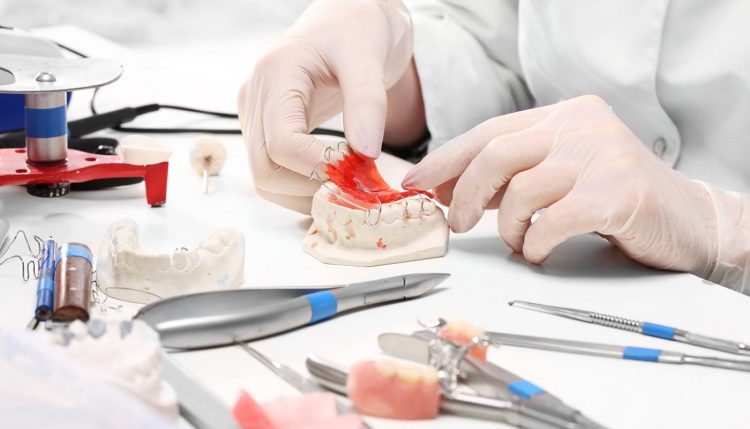Dentures Repairs Sydney.

Dentures and Denture Repairs
A denture is a removable prosthesis made to replace missing teeth. Generally dentures are made out of acrylic resin and can be combined with various metals. Dentures improve chewing ability and speech, and provide support for facial muscles. The denture fabrication process takes approximately one month and roughly five appointments. After the initial diagnosis is made, impressions are made to determine proper jaw position. An appointment to “try-in” your new denture will be scheduled to assure proper color, shape and fit. The final denture is then placed and any subsequent visits for needed adjustments are made.
There are three basic types of dentures; full dentures, partial dentures, and overdentures. Full dentures replace all the teeth, while partial dentures fill in the spaces created by missing teeth and prevent other teeth from shifting and changing position. Full dentures are made when all of your natural teeth are missing or extracted, and like partial dentures can be worn on the upper or lower jaw or both.
Full dentures can also be called “conventional” or “immediate” depending on when they are made and when they are inserted into the mouth. Immediate dentures are inserted immediately after the extraction of any remaining teeth. To make this possible, the dentist takes impressions and makes models of the patients’ mouth during a preliminary visit. An advantage of immediate dentures is that the patient does not have to be without teeth during the healing process after the extractions. Bone and gum tissue will shrink over time, especially in the first six months after tooth extractions. Immediate dentures may require occasional “relining’s” to maintain proper fit. A conventional denture can be made once the tissues have stabilized, usually nine months to one year following tooth extractions. Ridge preservation therapy at the time of tooth extractions will minimize the change in fit of the immediate denture.
Partial dentures consist of replacement teeth attached to acrylic bases, which are connected by metal framework. Partials attach to your natural teeth with metal clasps or precision attachments. Precision attachments are generally more esthetically pleasing than metal clasps and are nearly invisible. Crowns on your natural teeth may be advised to improve the fit of a partial denture and they are usually required with attachments. Partial dentures with precision attachments generally cost more than those with metal clasps.
How long will it take until I feel comfortable with my dentures?
For the first few weeks, a new denture may feel awkward or bulky. Your mouth will eventually become accustomed to wearing it. Inserting and removing the denture will require some practice. Never force the denture into position by biting down (this could bend, warp, or break the prosthesis). Start out with soft foods that are cut into small pieces. It is important to chew evenly on both sides of the mouth to keep even pressure on the denture. Some people worry about how dentures will affect their speech. Pronouncing certain words may require practice. Reading out loud and repeating troublesome words will help. If your dentures occasionally slip, reposition the dentures by gently biting down and swallowing. The best way to get used to your new denture is to wear it all the time. Although this may be temporarily uncomfortable, it is the quickest and easiest way to identify denture parts that may cause any kind of irritation to the gums. If your denture applies too much pressure on a particular area, that spot will become sore. A quick adjustment can be made to ease the pressure and get you feeling more comfortable.
What is the best way to care for my denture?
Brush the denture with a denture brush daily to remove food debris and plaque, and to keep it from becoming permanently stained. Avoid using a brush with hard bristles, which can damage the denture. It’s best to use denture tablets or water to soak your dentures at night, but hand soap or mild dishwashing liquid is also acceptable to clean them. Other types of household cleaners and many types of toothpaste are too abrasive and should not be used on dentures. Please remember, that even with full dentures you still need to brush your gums, tongue, and palate every morning before you put in your dentures. This removes plaque and stimulates circulation in the mouth to keep your mouth healthy.
Oral health care and dentures:
• Daily remove and brush the denture carefully with a brush and toothpaste, both specifically designed for denture cleaning.
• Avoid the use of harsh abrasive cleaners on your denture.
• Avoid cleaning and/or sterilizing your denture in boiling water, or damage to the denture is likely to occur.
• If a partial denture is in place, remove it before brushing the natural teeth.
• Once removed, keep the denture in a safe place, out of the reach of children.
• Once removed, soak the denture in a proper cleansing solution or water.
• Have your teeth cleaned every 6 months by an oral health professional
All denture users require some time to get accustomed to the denture. Features to get accustomed to are teeth alignment, speech and facial expression. The length of time to get used to a new denture is patient specific but could take up to eight weeks to fully adapt to the new appliance.
SAME DAY DENTURE RELINES / REPAIRS
If you would like to make an appointment with one of our doctors regarding a denture or would like further information please do not hesitate to contact us and one of our friendly staff will assist you with your enquiry.
If you require any more information on Dentures and Denture Repairs Sydney please do not hesitate to contact us.







